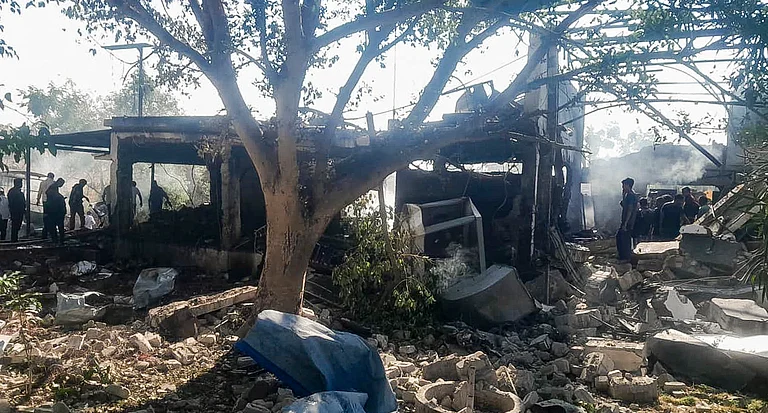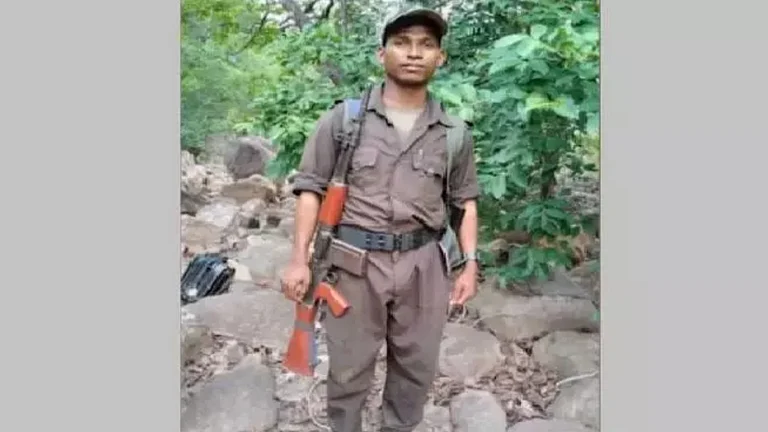Retribution and fired-up survival instincts resound throughout Chhatrapal Ninawe’s layered excavation of the Maoist-cop equation in Ghaath. The director, who has co-written the film with Vikas Mudki, steers the drama in an impressive, albeit inconsistent three-way route. Divided into chapters with titles evoking the Adivasi slogan “Jal Jungle Zameen”, the film opens with a fugitive Maoist revolutionary, Falgun (Dhananjay Mandaokar), who’s switched to a quiet, discreet life.
Nothing much happens in Deori, the town in Chhatisgarh where he lays low. But he has his eyes peeled on the dealings and whereabouts of ACP Nagpure (Jitendra Joshi grounding the film with its most condensed, affecting performance). The news on the radio exults the significant success of Operation Green Hunt, a concerted effort by the State to wipe out the Naxalite insurgencyfromChattisgarh’s forests. These forests become a critical setting in the film’s final chapter. Falgun has revenge on his mind. As he secretly trails Nagpure, the second chapter swings into the police officer’s perspective.

Nagpure would rather gladly rid himself of his posting. The relationship between him and his family has turned frosty. There are several demands on him. Either he needs to carry out his job or abandon it and go back to his wife and kid. When he learns that a transfer somewhere safer lies in brokering a Maoist surrender, he sets himself to it. In the pursuit of the Maoist casualty necessary for his escape, he stumbles across a tribal, Perku (Janardan Kadam). The first time he bumps into Perku, the latter unsettles him. Yet, he keeps returning. The place grows into a haven for Nagpure. It’s an island unmoored from strictures of authority and hierarchy.
In the scenes with him just shooting the breeze with Perku, we are struck by the officer’s levity and lightness. There’s a glimpse of what the man could have been if he didn’t have to function within official frameworks. The system wherein he is an emissary of order and justice feeds instead terror and caginess. Moments Nagpure and Perkushare brim with the innocence of a worldview that hasn’t yet been cruelly conditioned or is a fragile liminal state that may just be doomed. But Ninawe doesn’t elide the inescapable brutality about to smash this affectionate, naïve friendship. Perku is the primeval man. He calls the river his mother, before Nagpure gently informs him the river has shrunk to a lake. The jungle speaks through him, he adds. Perku gets so alarmed at Nagpure’s phone buzzing he scampers away. Slowly, an apparent mutual trust sprouts between the two.
Depicting an unmediated reality, the chapter is Ninawe at his most confident and lithe as a storyteller. The real and the imagined meld into a surreal mist of sequences. Udit Khurana’s camerawork suggests an epic, heightened marriage. The stillness in the air fills with foreboding, as does the tight grip of desolation.
However, Ghaath’s existential curiosity and searching pathos are wonky among its three chapters. In the third section, the film gets sidetracked into an unwieldy tangle of plotting and backstabbing. Raghunath (Milind Shinde), Falgun’s brother and Maoist leader, assumes centre stage. Inured by the Red movement spiralling into misdirection, he seeks an exit from the chaos and carnage. Ninawe protracts the action, the inter-group tussle among the cadres but goes remiss with local specificities of the village hemming the forest. Women too are sidelined. The sole female character given some space, Kusari (Suruchi Adarkar), whom Raghunath implicates in his undercover tasks, is the standard wretched figure thrust into vindictive helplessness.
The writing turns lumpy, overexerting itself. Ninawe’s ambitious, expansive storytelling goes too broad while straining to lay bare the factionalism within the People’s War Group. Many accounts are to be settled; avaricious agendas grotesquely expose themselves. The plotting becomes too busy, wearily conventional. Is Raghunath, who promises justice to the villagers routinely hassled by the paramilitary, dependable at all? Could he be having manipulative designs of his own? The web of deceit and betrayals, clogging the narrative, would have worked had the film dwelt into Raghunath’s psyche. Instead, we get an externalised, unnecessarily jampacked view of terrible, messy situations snowballing to a point of no return.
Ghaath suffers from a purposeless imprecision, similarly when it tries to rally for the stakes the complex situation poses to the villagers. Once again, they come off as bumbling victims, caught in the crossfires between the Maoists and the CRPF, pushed to an abyss of their collective undoing. The whole section runs in circles, retreading what has already been proposed. We get the drift. Ninawe underlines the two opposing sides as not very different from each other. The ethical lines blur. Whom should we trust? Whom to turn to? That’s the needle point of enquiry, where from Ghaath operates. In these jungles, to go by the film, complicity and honesty divest themselves of well-defined boundaries. Moral corrosion, be it of the Maoist cadres or the police officers, spring in the film as being strapped to a system that exhorts them to put aside a primary sympathy. Self-preservation hijacks. It’s the law of the jungle, a restless instinct for ensuring one’s survival which trumps every other human, fair and compassionate considerations.
Ghaath unravels with disillusionment and nihilism colouring every plot development. Each character we encounter feels almost irredeemable by the end, but they also display a hint of their kinder side. In a latter scene, Nagpure talks of the fear that drives him to kill with impunity. We believe him because we had already seen a glow of his warm, funny and lively humanity. Ghaath burns with undeniable power and vigour as long as it skirts the line between empathy and monstrosity.

























